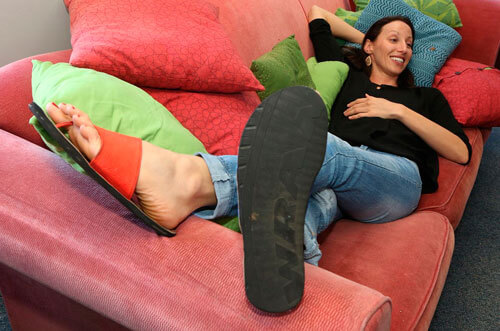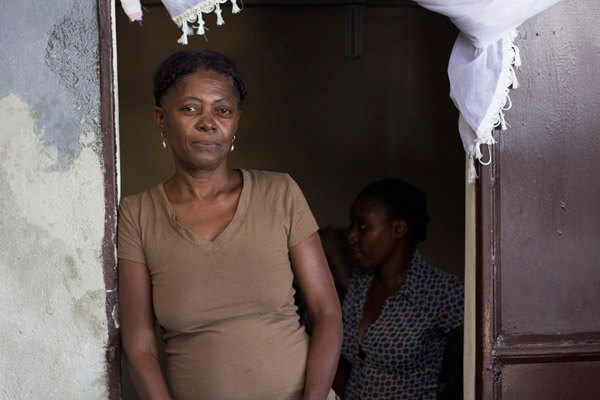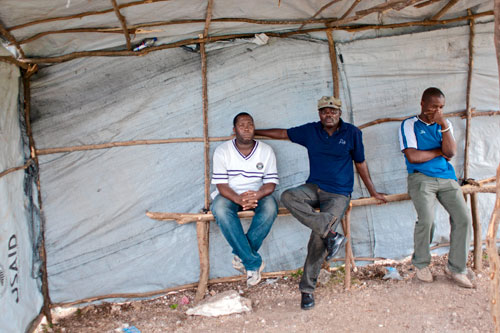ORLANDO, Fla. (AP) _ In a small concrete-block office in downtown Orlando, Julie Colombino — a former Cirque aerialist turned disaster-relief worker — is trying to change the world through sandals.
Colombino, 35, is surrounded by scores of them: simple, hand-crafted sandals of Haitian goat leather and recycled tires _ sandals whose creation has caught the attention of both the United Nations and New York fashion mogul Kenneth Cole.
He’s now selling them.
“It’s crazy,” Colombino says. “When I started, I never fathomed it would be like this.”
In January 2010, a week and a half after a catastrophic 7.0 earthquake struck Haiti, Colombino left her Winter Park home and caught a flight to the epicenter of the disaster. An estimated 160,000 people were dead; two million people were newly homeless.
She soon found herself stationed in a first-aid camp, irrigating gaping wounds and handing out expired Tylenol to those who really needed morphine.
“I had no medical expertise, and we had no real pain medication to give them,” she says.
At times, surrounded by the sights, sounds and stench of agony, it was all she could do not to pass out.
Yet a month into her mission _ a month of sleeping in a tent, sometimes without fresh water or food, each night worrying she would be raped _ she returned to Central Florida only to resign from her job, sell her belongings and take her $7,000 in life savings back to Haiti.
“I know it sounds lofty,” she says, “but the truth is that I was just called to it.”
“Julie is fearless,” says Robert Brown, president and CEO of the Heart of Florida United Way, where Colombino worked a day job. “I mean, she used to swing on those curtains they have at Cirque. I figured if she could do that, she could do just about anything.”
Those initial, chaotic months are now largely a blur, save for one lasting impression: Once people moved beyond the basics of food, water and medical care, what they wanted most was a job. Even before the earthquake, Haiti was the poorest nation in the Western Hemisphere.
In the devastated capital of Port-au-Prince, Colombino used her tiny nest egg to hire four Haitian workers and launch REBUILD Globally, a nonprofit, in a lean-to covered by a tarp. Together, the five would sit on the floor, using razor blades to cut sandal soles from discarded tires that would otherwise be burned as rubbish.
“They were horrendous,” Colombino says of the early results. “They were heavy and ugly. But we were really proud of them, and people were actually starting to buy them, which blew our minds.”
They sold for $20 a pair, mostly to foreign aid workers.
Colombino then hired a Haitian cobbler to train her workers on the finer points of shoe-making, and with each prototype, the sandals grew more attractive and comfortable. A team from Nike showed them how to incorporate arch support, and, in 2012, the United Nations team in Haiti granted REBUILD $30,000 to hBut the operation has never been just about selling sandals. In Haiti, REBUILD’s social enterprise is considered revolutionary. Colombino’s organization pays the workers a decent salary — an average of 225 percent above the Haitian minimum wage of $5.11 a day — allowing them to buy their own homes and, often, to “adopt” their own children back from orphanages. Many of the parents, Colombino learned, had been forced by extreme poverty to surrender their sons and daughters to someone who could feed and shelter them.
To international poverty experts seeking to remedy the sometimes toxic effect of charity, REBUILD is a breath of fresh air.
“That whole model of the hand up, not the hand out, is the new paradigm,” says consultant and children’s welfare advocate Dick Batchelor, a former Florida state representative, who visited the Haiti operation and donated a large piece of manufacturing equipment.
For Colombino, though, there was a high personal price. During five years in Haiti, she suffered dengue fever, malaria, fractured vertebrae from a taxi accident, pneumonia and, last fall, mononucleosis. She moved home to Central Florida to recover, just as Kenneth Cole was launching a boutique in Petionville, an upscale suburb of Port-au-Prince. Cole, known for his humanitarian efforts on issues from HIV/AIDS to homelessness to global health, went with a team of company associates to the Caribbean for a community-service project.
They wound up at REBUILD for what was supposed to be a makeover of its on-site store. Instead, Cole sat down with the artisans, chatting through an interpreter, and began sketching out sandal designs.
At first, the “Love Haiti” sandals the artisans made from those sketches were to be sold only in Cole’s Haitian boutique. But the company ordered an initial 500 pairs and is selling them on its website and in U.S. stores at $69 to $79. A reorder is expected within days.
Cole, who was unavailable for an interview, tweeted that his people came away from the experience stunned and inspired.’’
Meanwhile, Colombino and her team have expanded their Haiti headquarters to a two-acre facility with five buildings and 21 employees. They’ve sold some 8,000 pairs of sandals so far and just launched a for-profit brand called Deux Mains (“two hands”), owned by the Haitian artisans who make the sandals. This year, the nonprofit operation that began five years ago with $7,000 will have a $300,000 budget — and Colombino’s board of directors just boosted her salary from $24,000 to $40,000 a year.
With her new home base in Orlando, Colombino also has hired a full-time director in Haiti and will shift her focus to replicating REBUILD’s business model elsewhere, including in Central Florida.
“We have seen over and over again that the way we’ve helped vulnerable people in the past — by just giving them things — does not work,” she says. “But when they make a product that people buy not out of sympathy but because it’s a good product, and their children witness their parents succeeding, this is how we will end poverty, one step at a time.”




























